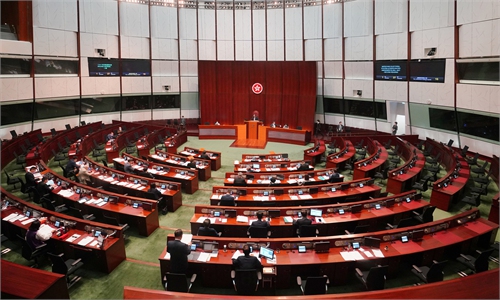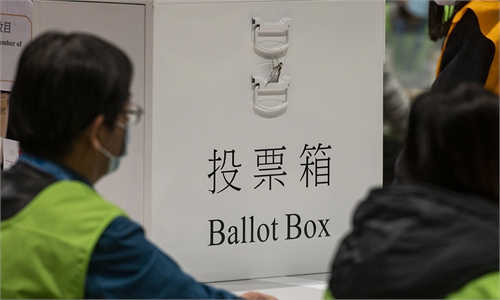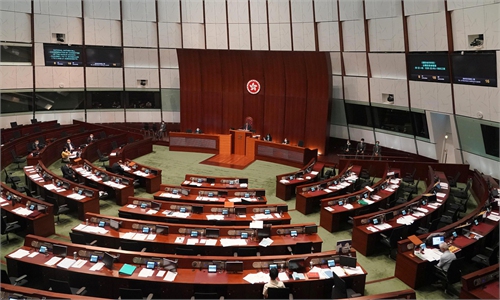West ‘cries foul’ after losing battle on HK, attempt to incite color revolution fails
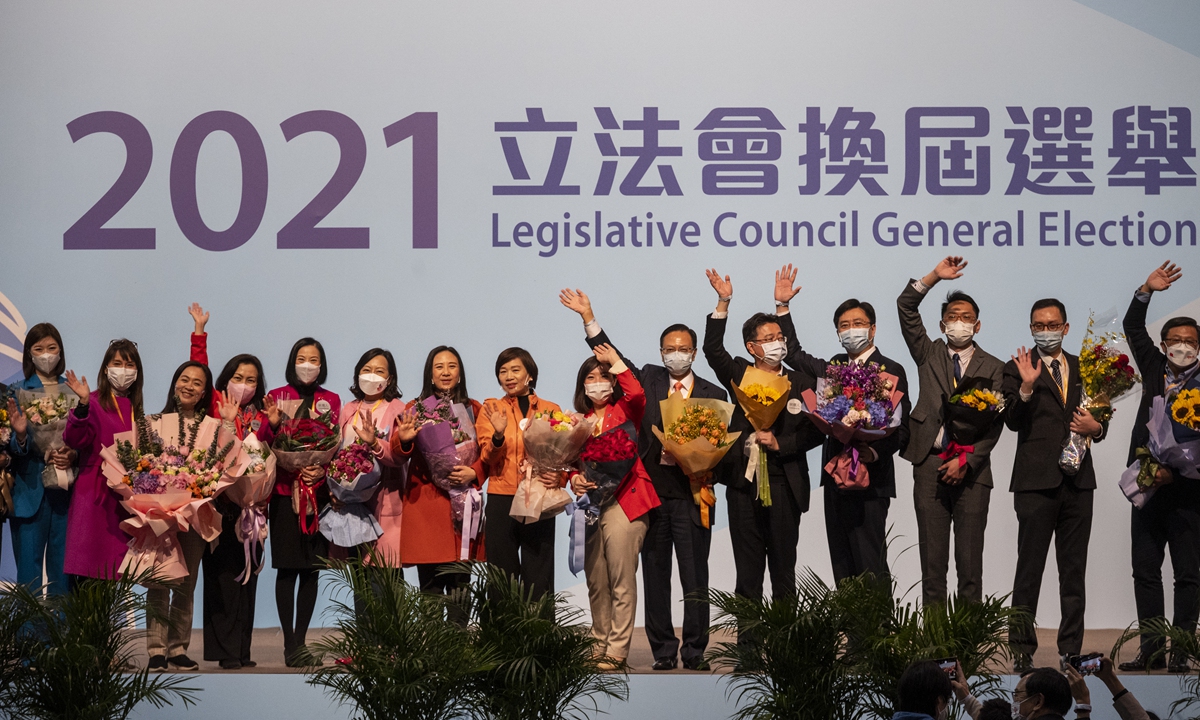
Hong Kong LegCo election Photo: VCG
After Hong Kong concluded a successful Legislative Council (LegCo) election, G7, EU and Five Eyes alliance could not wait to point a finger at it, which was considered as a staged political farce and a scene of "crying foul" after the West-led cliques completely lost the battle to contain China by interfering in Hong Kong affairs, experts and officials said. They noted that using so-called democracy as cover for such an ill-intentioned attempt is their last fig leaf as China wields an anti-interference battle.
In addition to a statement issued by Five Eyes countries including Australia, Canada, New Zealand, the UK and the US voicing "grave concern" over the "erosion of the democratic elements of the HKSAR electoral system," the G7 and EU voiced a similar concern over the outcome of the LegCo election. At least six Chinese government departments including the Hong Kong and Macao Affairs Office of China's State Council, the Chinese Foreign Ministry, Chinese Foreign Ministry's commissioner officer in Hong Kong, the Chinese embassy in the UK, the Mission of China to the EU, the liaison office of the central government in Hong Kong and the Hong Kong Special Administrative Region (HKSAR) government condemned those groundless claims, which only exposed those countries' malicious attempts to incite trouble in the Chinese city in order to contain China.
"Under British colonial rule, Hong Kong had never enjoyed any democracy, but no so-called democratic countries expressed concerns over that," Zhao Lijian, spokesperson of the Chinese Foreign Ministry, said refuting the so-called concerns raised by the US and some other Western countries.
Hong Kong's democratic formats have been gradually flourishing and their quality continuously improving, but certain Western countries jumped up and shamelessly expressed the so-called concern and arrogantly attacked Hong Kong's democracy and rule of law, which fully exposed their hypocrisy and malicious attempt to incite trouble in HKSAR and contain China's development, Zhao noted.
Under the Western interference, Hong Kong has long been serving as an anti-China bridgehead, but the implementation of the national security law for Hong Kong and the electoral reform have ended those countries' fantasy of instigating a color revolution through their cultivated political proxies and agents, and the seemingly "collective voice" that criticized the Chinese government and Hong Kong democracy only showed that the US-led West clique has become a complete loser in China's anti-interference battle on Hong Kong affairs, Chinese experts and officials said.
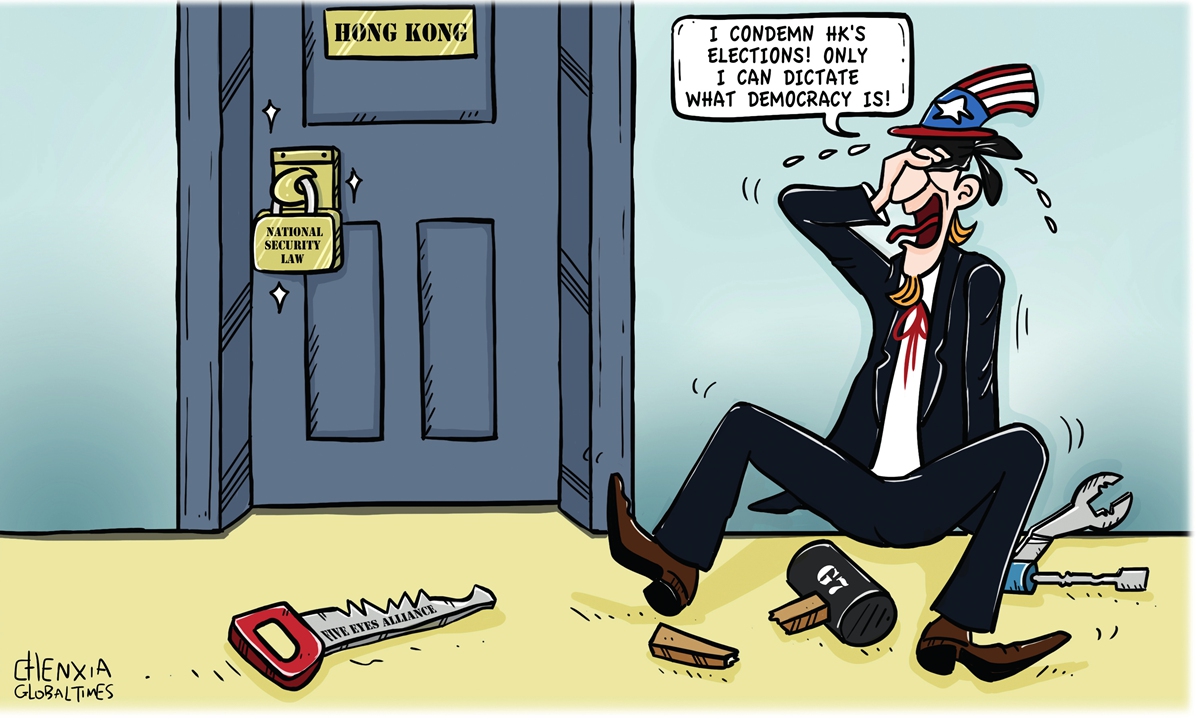
Illustration: Chen Xia/GT
Anxiety of the West
The latest LegCo election was the first election held on the basis of a peaceful social environment and the rule of law, compared to the growing threats some voters and candidates faced in late 2019 after the district council election. The LegCo election sent a message to all Hong Kong residents that a fair and justified election could be held without being exposed to any violence or threat, said Priscilla Leung Mei-fun, who received the highest number of votes in the Election Committee constituency of the LegCo election.
"Those Five Eyes alliance and other Western countries appeared to be so anxious that they may soon lose their attraction among Hong Kong people that they came up with these smears against our new electoral system, because they know the new system will bring significant development to the city, which is widely supported by local residents," Leung told the Global Times on Tuesday.
All the 90 members of the 7th-term Legislative Council of the Hong Kong Special Administrative Region (HKSAR) were elected on Monday. They were elected by the Election Committee constituency (40 seats), functional constituencies (30 seats), and geographical constituencies (20 seats) after over 1.35 million Hong Kong residents voted on Sunday.
All 153 candidates competed with different ideas, contributions and responsibilities, and the principle of only patriots governing Hong Kong is not a "mono soundtrack," but lawmakers with different backgrounds and stances who can participate in governance in an effective way.
However, the statements of the Five Eyes, G7 and EU cited some wrong facts such as the electoral reform introducing a vetting process that "severely restricts the choice of candidates" and the absence of dozens of political figures from the opposition camp undermined Hong Kong's rights.
The vetting process mentioned in the statement is actually the candidate qualification review committee for local elections, which aims to ensure candidates meet the principle of "patriots governing Hong Kong," a fundamental baseline set by top Chinese officials on Hong Kong affairs.
"The statement of the G7 and EU was typical double standard," Leung Chun-ying, former chief executive of the HKSAR government, said in a Facebook post. "Will secessionist lawmakers be elected in Spain's Catalonia?" Leung asked.
The Mission of China to the EU also expressed strong dissatisfaction and firm opposition to the EU's blatant interference in China's internal affairs, as the HKSAR is part of China. How the regional electoral reform is designed, improved and functions is purely China's internal affairs and foreign countries have no right to interfere in it, the mission said in a statement sent to the Global Times on Tuesday night.
Lost battle
Since the social turmoil in 2019, there have been political proxies cultivated by external forces in Hong Kong who incited trouble, colluded with Western politicians and supported secessionists by turning a blind eye toward violence, chaos and rioting. These individuals such as infamous secessionists Jimmy Lai Chee-ying and Joshua Wong Chi-fung frequently visited other countries to push for the passage of Hong Kong-related bills, lobbying for American sanctions against China, and meeting with officials at the US consulate in Hong Kong for "dirty deals."
The national security law for Hong Kong, which took effect on June 30, 2020, and the electoral reform, which was passed on March 30, 2021, are widely considered as the sword and shield to end the era when external forces and their political proxies meddled in Hong Kong affairs. The two steps unveiled a new page for effective local governance, according to Chinese officials and experts.
In this geopolitical wrestling in which the US-led West sought to contain China by instigating a color revolution in Hong Kong, Western countries have completely failed, some experts said.
However, in its final hysteria and struggle, some Western countries like the US have not given up on their fantasies and continued interfering in Hong Kong affairs by imposing so-called sanctions on senior Chinese officials, which were despised by China.
Wang Yi, Chinese Foreign Minister, also said at an event on Monday that China-US interaction should be based on an equal basis, and if the US continues confrontation, China will fight to the end.
"There's no surprise that those countries reacted this way, as it's becoming increasingly difficult for their agents to incite trouble in Hong Kong," Lau Siu-kai, Vice President of the Chinese Association of Hong Kong and Macao Studies, told the Global Times on Tuesday.
When it's difficult for the US to contain China from the position of strength, it has to play the card of ideology by slandering China's political system, including the HKSAR's, Lau said, noting that Western-style democracy is engulfed in a deep dilemma.
Western countries such as the US and the UK have become "inferior students" in the world's democracy class but they always attempt to be "a teacher," the Hong Kong and Macao Affairs Office of China's State Council said in a statement issued on Tuesday night. "They have so many bad records on their own democracy practice but they use the name of democracy and human rights to interfere in other countries' internal affairs and to contain others' development. Who is practicing the real democracy and who is practicing the fake one, it's pretty clear," the office said.

